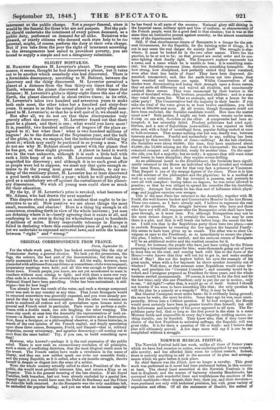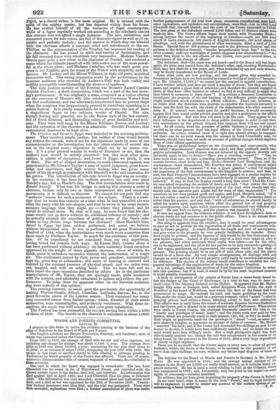NORWICH MUSICAL FESTIVAL.
The Norwich Festival held last week, unlike all those of former years which we have had occasion to notice, was undistinguished by any remark- able novelty, and has afforded little room for critical remark. Indeed, there is scarcely anything to add to the account of its plan and arrange- ments which we gave before it took place. Its chief feature was the Elijah, now no longer a novelty. This great work was performed as it never had been performed before, in this country at least. The choral band assembled at the Norwich Festivals is the best in England; and the masses of harmony whereby Mendelssohn has conveyed with such wonderful force and truthfulness the emotions of the Jewish multitude—their despair, their fury, their joy, and their devotion— were produced not only with technical precision, but with great variety of expression and effect. Of all the successors of Handel, the author of 75:e7s, as a choral writer, is .the most original. He is imbued with the watt of the mighty master, but 'has departed widely from his forms. He -has availed himself of all the resources of fugal counterpoint; while of a fugue regularly worked ottt according to the scholastic canons this oratorio does not afford a single instance. The airs, recitatives, and Concerted pieces for solo voices, are full of dramatic vigour as well as of ex- guieite and pathetic melody; and the manner in which they are blended with the choruses affords a constant relief and refreshment to the .ear. Phillips, as the representative of the Prophet, has improved his-reading of the character. He has gained in spirit and variety of declamation, and his full resonant tones were sometimes very impressive. Madame Viardat- 'Garcia gave quite a new effect to the character of Jezebel, and rendered a scene which has hitherto passed off with little notice one of the most power- pal in the whole piece; and Madame Castellan, who has made great pro- gest in her English, gave the scene of the Widow with simplicity and ten acmes& Mr. Lockey and the Misses Williams, in their old parts, acquitted 'themselves well. The strong impression made by the performance on the immense audience who crowded St. Andrew's Hall was both visibly and audibly perceptible notwithstanding the absence of applause. The only positive novelty of the Festival was Mozart's Sacred Cantata David& Penitente; a short composition, which was a part of the last morn- ing's performance. It was originally a mass, composed as a votive offering on the recovery of Mozart's wife (the celebrated Constance Weber) from her first confinement; and was afterwards transformed into its present shape when the composer was inopportunely pressed to contribute something to a palls festival. It Is chiefly remarkable for its choruses; the last of them a magnificent fugue on two subjects, worthy of Handel. The airs, though flowing and graceful, are in the Italian style of the last century, 'full of florid divisions, and demanding voices of great flexibility and com- pass. They were well sung, by the Misses Williams, Reeves, and Lookey; and the execution of the choruses was admirable. Davidde Penitente, thus resuscitated, deserves to be kept alive.
The Creation and Israel in Egypt were included in the morning perform- ances. They received ample justice; but neither of them would furnish any subject for remark, were it not for the objections made by some of our contemporaries to the introduction into the latter oratorio of several airs not in the original score; objections in which we by no means con Our. It is a good general maxim in works of literature or art, that the author's text should be strictly preserved: but, like most other gene- ralities, it admits of exceptions; and Israel in Egypt, we think, is one .of them. The act of alleged desecration, so much clamoured against, was perpetrated by Mr. Edward Taylor; a man of sound judgment, great know- ledge and experience, and high artistic feeling, who has given many proofs of his thorough acquaintance with Handers works and veneration for his genius. The introduction of airs into Israel in Egypt was no novelty: on the contrary, it has been the uniform practice, not only ever since Handel's day, but in Handel's day. The first interpolations were made by Handel himself. What was his design in making this oratorio a series of choruses, broken only by two or three unimportant airs and concerted movements, it is difficult to discover. We cannot for our part find any "/esthetic " reason for such a treatment of the subject. There is a tradi- tion that he wrote this oratorio at a time when he had quarrelled (as was often the case) with his solo-singers, and that he swore in his usual uncere- monious language that they might go—where they pleased, and he Would do without them. Be that as it may, he soon found that his cho- ruses would not go down without an additional infusion of melody.; and he actually adopted the expedient of getting some of the Opera cele- brides to sing Italian songs between the choruses! Since Handers time, Israel in Egypt has been seldom performed, and never, we believe, without interpolated airs. It was so performed at the great Westminete Festival of 1334, when the interpolations were much more numerous than those made by Professor Taylor. So much for the existence of this prac- tice. Of its expediency we are convinced from our own experience, having heard the oratorio both ways. At Exeter Hall, (where alone it hiss performed without addition) we have.uniformly found ourselves oppressed by the weight of these gigantic choruses, eleven of which, we think, occur in unbroken succession without the intervention of a single air. The excitement caused by their power and grandeur, unremittingly kept up, gives way to exhaustion; the sense of hearing is stunned and blunted by the constant pressure of .physical sound; and we retire worn out, languid, and with an aching head. This we have felt, and we have heard the same sensations described by others. As to the particular interpolations of Mr. Taylor, they are sparingly made, quite consistent with the context, and admirably calculated to lighten and relieve the per- formance. To judge from its apparent effect on the Norwich audience, they were entirely of this opinion.
The evening concerts, as usual, gave the provincials the opportunity of bearing Viardot-Garcia, Alhoni, Castellan, Lablache, -Reeves, &c., in the Most favourite pieces of the London season. They contained too many long concerted scenes from Italian operas; which, divested of their scenic accessories, were unintelligible, and evidently wearisome. With these ex- ceptions, the music was well selected, and gave great satisfaction.
The Festival has been successful, the receipts having been within a trifle of those of 1845. The benefit to the charities is estimated at about 1,0001.



























 Previous page
Previous page